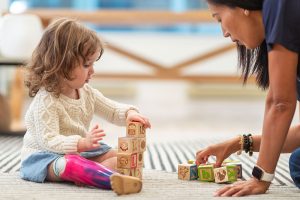 Every caring parent wants the best for their child, wanting them to thrive, and grow up happy and healthy. But when a child is born with limb loss, or is sick or injured requiring an amputation, a parent can be overwhelmed with their own emotions of grief, anger, guilt and more.
Every caring parent wants the best for their child, wanting them to thrive, and grow up happy and healthy. But when a child is born with limb loss, or is sick or injured requiring an amputation, a parent can be overwhelmed with their own emotions of grief, anger, guilt and more.
Be assured those rollercoaster emotions are perfectly normal, but can be difficult to overcome.
Seek support from family and friends. Find a person who listens well and can understand your family situation. Don’t be afraid to ask for help and take what help is offered. Learning more about your child’s condition and the methods available to help them grow and thrive will help you understand there is a future. It may help to speak to a professional counselor or therapist to work through your feelings … whatever you need to bring you strength to help you and therefore your child accept the situation.
Research has found that parental adjustment and family support to be significant factors related to a positive psychosocial adjustment in children.
As a loving parent, you will find yourself giving up your own needs as you want to put the needs of your child first. But you do need to pause and think about yourself. Taking care of yourself is not being selfish. On airplanes, you always hear the safety message that if the oxygen masks fall down, put yours on first so you can help others if needed. That goes with parenting too. Eat well, get rest, exercise, take a time out for you, and ask others to help so you can have a break. It’s normal to put the needs of your child first, but you can’t give to others if you don’t take care of yourself.
Be Prepared for Questions
It’s not unusual to be asked questions from extended family, friends or a random stranger and you should be comfortable with how you respond. Practice what you want to say and get comfortable with it. Be positive about your words — the more positive you are, the more your child will be as well. Plus, positivity provides cues to others on how to act towards your child.
Generally, people are not being deliberately hurtful, it’s because they don’t understand or have never met a person with limb loss. It might be helpful to keep in mind that speaking about limb difference can be empowering, as it’s a chance to educate others.
Peer Support
Many parents find peer support groups are immensely helpful. Taking part in a local support group may help you to adjust to your child’s disability and introduce you to further resources in your area.
The Amputee Coalition also operated a national peer network, where you can get in touch with other amputees in your geographic area. The Coalition offers support groups, hospital partnership programs, youth camps, and a certified peer visitor program.
The Association of Children’s Prosthetic-Orthotic Clinic (ACPOC) is a great resource too. Visit https://acpoc.org/parents for a wealth of information.
Talking to your child
Children are remarkably adaptable and as toddlers, they may not even recognize their limb difference. However, once they are in daycare, preschool and beyond, they need to know how to respond to the inevitable questions and comments.
Encourage them to be ready to talk about their condition …. I was born this way; I had an accident; I was very sick … and why they have a prosthesis and how it works.
It’s important to discuss in advance with the child’s teacher, principal, and others who may be involved about any special needs the child requires. But emphasize you do not want the child treated differently from others and the child needs to be included in as many common or group activities as possible. A prosthesis makes it possible for amputees to participate in almost any sport or activity.
As pre-teens or teens, there are different challenges. Those in that age group are likely to be concerned with body image and not wanting their prosthesis to be visible. They may decide they no longer want to participate in a sport they previously enjoyed. Parents should continue to be positive and supportive. If sports participation is the issue, perhaps there are other outlets for them to stay engaged with their peers, such as a debating club, computer club, language club, or music and fine art groups, to name a few.
Your child’s (and yours) journey through navigating limb loss will have some challenges. But it’s important that the child — no matter the age — can achieve just as much as anyone. All they need is the best support they can receive from a parent who accepts the limb difference and helps them to overcome emotional and physical limitations.
If you are looking for reading material for children about others with limb loss, the Amputee Coalition listed a number of titles to choose from. You can check them out here.